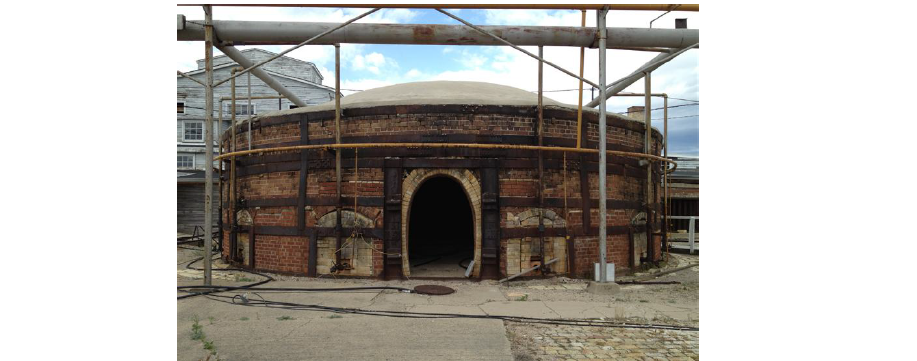1 Structural Engineer-in-Training, J.C. Kenyon Engineering Inc, Regina, SK, S4S 2E4, Canada, btaylor@jckenyon.com
2 Heritage Architect, Ministry of Parks, Culture, and Sport, Regina SK, S4P 4H2, Canada, patricia.glanville@gov.sk.ca
ABSTRACT
After operating for 76 years, the Claybank Brick plant was closed in 1989 and was declared a National Historic Site in 1997. The most distinctive structures on the site are ten masonry kilns that were constructed with 450 mm thick walls and 10972 mm diameter masonry domes. During operation of the brick plant the kilns had been rebuilt and repaired as required, however extreme temperatures during operation and existing soil conditions left these kilns in need of extensive rehabilitation.
In an ongoing effort to balance economy and preservation of the brick plant, four of the kilns had been abandoned and left to deteriorate, while the remaining six kilns became part of an ongoing preservation effort.
During a recent structural assessment radial and horizontal cracks, localized inward deflection of the dome, and efflorescence was observed in each of the kilns. It was concluded that the radial cracks and the outward expansion of the dome were within a safe limit. It was also concluded that the horizontal cracks and inward deflection of the roof may be early signs of localized failure, particularly individual bricks falling out of the dome roof.
This paper presents a brief history of the kilns, the findings of the structural investigation, and a discussion on how the kilns were assessed. The results of the assessment were compared to the deteriorated state of the four abandoned kilns to confirm the findings.
KEYWORDS: masonry dome, water infiltration, preservation, masonry investigation, radial cracking
563.pdf



